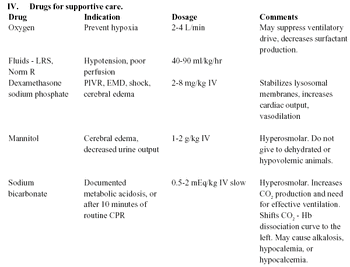
Two species of Hepatozoon organisms have been reported to infect domestic dogs worldwide.
Dr. Douglass Macintire received her veterinary degree from Texas A&M University in 1980. In 1981, she completed a one-year internship in small animal medicine and surgery at Louisiana State University. From 1981-84, she completed a residency in small animal medicine at Auburn University. She also received a master of science degree in veterinary medicine from Auburn University. From 1984-1990, She taught emergency medicine at the University of Pennsylvania. She became a diplomate of the American College of Veterinary Internal Medicine in 1986. In 1990, she became the first individual to pass the certification examination issued by the American College of Veterinary Emergency and Critical Care. She is a professor at Auburn University College of Veterinary Medicine where she teaches emergency medicine and is the co-director of the Auburn University Critical Care Service. Dr. Macintire has spoken extensively on subjects pertaining to emergency medicine and critical care and infectious diseases to both national and international audiences. She serves as the small animal editor for Compendium on Continuing Education for the practicing veterinarian.

Two species of Hepatozoon organisms have been reported to infect domestic dogs worldwide.

Canine babesiosis is a tick-borne disease caused by a hemoprotozan parasite belonging to the order Piroplasmida within the phylum Apicomplexa.

Immune mediated hemolytic anemia (IMHA) can be a common cause of acute lethargy, depression, weakness, and collapse in emergency patients.

Diabetes mellitus occurs in both dogs and cats and is the most common endocrine disorder in the emergency setting.

Critically ill animals are often presented to the veterinarian for emergency medical management.

Hypoadrenocorticism, or Addison's disease, results from deficient production of glucocorticoids and/or mineralocorticoids by the adrenal glands.

Cardiopulmonary arrest (CPA) is the cessation of functional ventilation and effective circulation.

Without treatment, canine parvovirus (CPV) infection is often a fatal disease ending in severe dehydration, endotoxic or septic shock, and multiple organ failure.

In people, there are four types of heat-induced illness described: heat cramps, heat exhaustion, heat prostration, and heatstroke.

Parasites of the genus Babesia are hemoprotozoan organisms that can infect red blood cells of vertebrate hosts. Although more than 100 species of Babesia have been identified, only two have been reported to infect dogs: Babesia canis and Babesia gibsoni.

Published: August 1st 2008 | Updated:

Published: August 1st 2008 | Updated:

Published: August 1st 2008 | Updated:

Published: August 1st 2008 | Updated:

Published: August 1st 2008 | Updated:

Published: August 1st 2008 | Updated: